

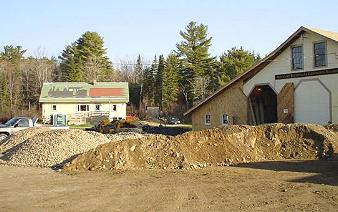
I had to pass on the Wiscasset, Waterville & Farmington Railway’s 2002 track laying during the long Columbus Day weekend. A visit from Sophie, my Colorado granddaughter, took priority ~ other grandfathers will understand! But there was no way that I would miss the ballasting weekend in late April, so after work on Friday I drove the 462 miles to Alna, Maine. As I did last year, I didn’t want to waste time stopping for food so I took along a bag of candy bars and a 12-pack of Coke. I arrived at Sheepscot Station around 1:30am, made a quick trip to the “green house,” and crawled into my car for a few hours of shut-eye. After biscuits and gravy at Karen’s Kitchen I was ready for work. When I arrived back at Sheepscot Station I saw what was ahead for us ~ a lot of that ballast and gravel had to be put on the WW&F right-of-way. By us! The front end loader had broken down the previous day, so we had to load flatcar 118 by hand for our first trip. Luckily it was repaired for all later loads ~ otherwise I might have needed some repairs myself!
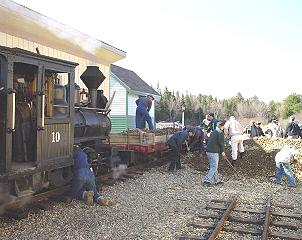
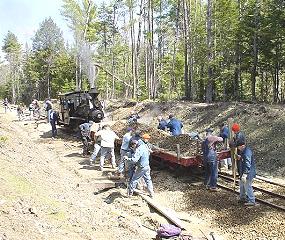
The trip out was wonderful ~ it was the first time that I had seen the WW&F Railway running steam, and I got a few cab rides, at last, in a steam two-footer. All my previous ones had been out on standard gauge, and, with the exception of Cass, West Virginia, last summer, on the west coast. There wasn’t much room for three of us in the cab so I did my best to stay out of the way of the engineer and fireman. Cab ride etiquette!
Locomotive #10 pulled all the work trains because it was faster than locomotive 52, their Plymouth diesel, and the management wanted to keep us busy. When we arrived at the unballasted section of the right-of-way, we got our shovels and started, you guessed it, shoveling. Thanks to gravity, unloading was a lot easier than loading. It was also readily apparent that ballasting my model railroad is nothing like doing it on the real thing.
One thing that’s really great about volunteering to work on the WW&F, or any other railroad for that matter, is that you learn how to do all sorts of things. For example, if it weren’t for helping to lay track the previous two year I would not know about tie placement or how to gauge the track and spike the rails. This year I learned not only how to ballast track, but also how to use a jack and level so the track can be used in normal service. Now the trains will have a smooth ride on a steady grade.
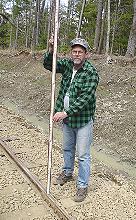

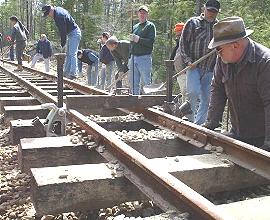

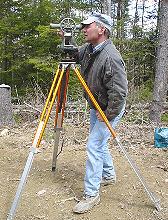
When I got tired while carrying rail last year, I tried to position myself between two taller and stronger workers. After all, I wasn’t as young as I used to be. Stopping to take pictures also saved my aching body. This year Steve must have realized I was a bit tired, because he asked me to be his “stick man.” while he used the transit. What a break! Maybe he thought I had taken enough pictures.
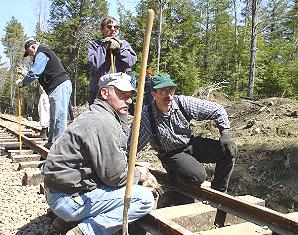
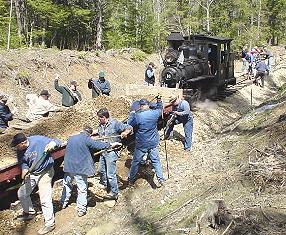
The goal for the weekend was to ballast 1,100 feet of track to reach the Humason Brook Trestle ~ we didn't quite make it. Still, the in-service track gives a great ride, and it will only get better.
We stopped around 6:30 and rode back for an absolutely wonderful dinner. Some of the talk later in the evening centered around Sunday’s weather, so I went to my car to get a current forecast. Snow and sleet, turning to rain. I quickly decided that I would rather head home on dry roads, so I returned to say my good-byes to the crew and began the long drive south to Delran, New Jersey, that evening. But rest assured, I plan to return next year for another work weekend on the WW&F!


 LINKS page
LINKS page